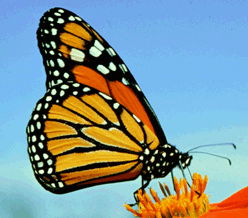
By Miriam Raftery
September 8, 2015 (San Diego’s East County)—California’s Environmental Protection Agency (EPA) has issued a notice of intent to label glyphosate, an herbicide that is the main ingredient on Monsanto’s Roundup, as a carcinogen“known to cause cancer.” The public has until October 5th to comment on the proposal.
Glyphosate has also been linked to a sharp drop in Monarch butterfly populations across the nation as well as to potential health impacts in humans.
As glyphosate use has skyrocketed and eliminated milkweed from agricultural fields, Monarchs’ primary food source, the butterflies have declined by more than 80 percent in twenty years, according to the Center for Biological Diversity.
A recent study on rats exposed to very low doses found adverse changes in the rats’ livers and kidneys. Additionally, the World Health Organization has concluded that glyphosate a probably carcinogen.
If the EPA designation is approved, it would require that all products containing glyphosate carry warnings on labels. In addition, places where the herbicide is applied could be required ot have notices posted to warn of exposure in advance, as Proposition 65 requires.
Center for Biological Diversity scientist Nathan Donley, in a prepared statement, praised the EPA for taking steps to protect people and wildlife form a toxic chemical. He says, “More than 250 million pounds of glyphosate are used each year in the United States, and the science is clear that it’s a threat to public health and countless wildlife species. It’s long past time to start reining in the out-of-control use of glyphosate in the United States.”
World usage of glyphosate is at an all-time high. Its use increased more than 20-fold, since 1990, largely due to the widespread adoption of crops, particularly corn and soy, that are genetically engineered to withstand what would otherwise be fatal doses of glyphosate. Residues of the toxic chemical are now found on 90 percent of soybean crops.
More use means more exposure, Donley says, adding, “It’s nearly impossible for people to limit exposure to this toxin because it is just so widespread. That’s why we need much tighter controls on its use.”
Monsanto has insisted that its product is safe despite evidence to the contrary, and claims the World Health Organzation’s data is flawed. The company engages in intense lobbying and makes hefty campaign donations to politicians, who have been reluctant to restrict genetically modified crops or use of glyphosate.
Now with California leading the way in declaring the chemical a carcinogen, some health and environmental advocates hope the labeling will be the first step toward ultimately banning the chemical, as was done with DDT and other products found to endanger human health or wildlife.







Comments
Glyphosate